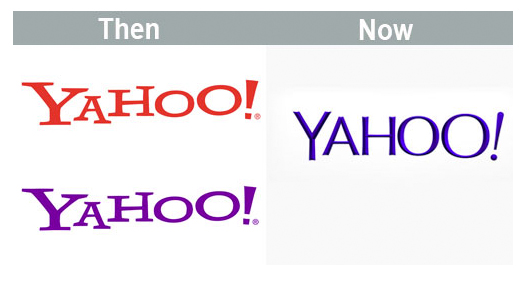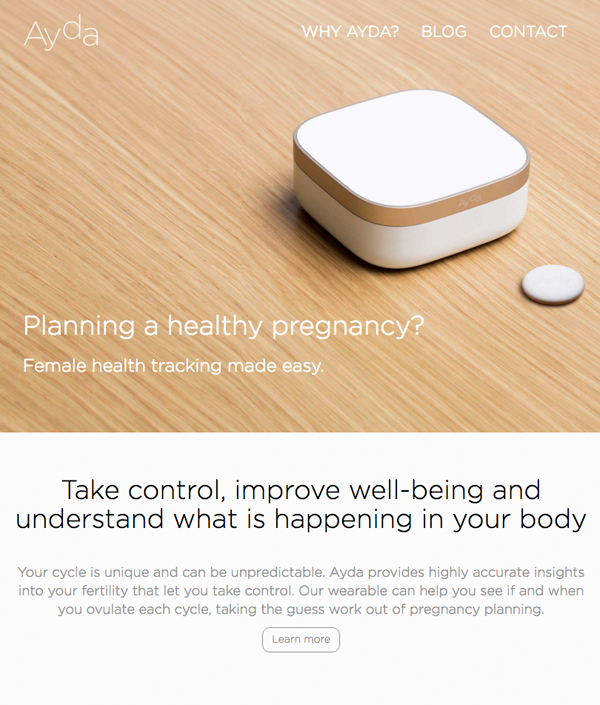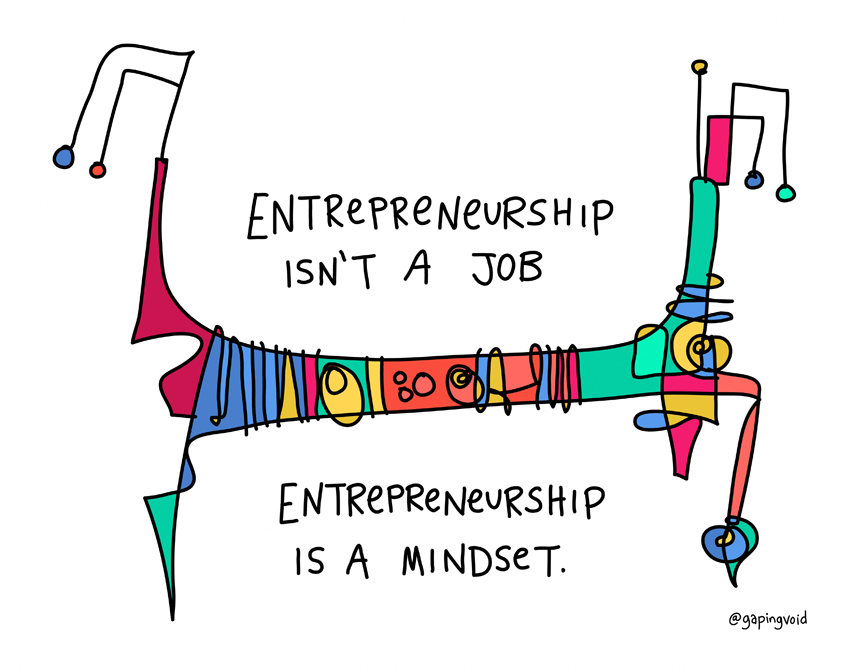10 Branding Tips From Silicon Valley on How to Be a Successful Startup Brand
From Silicon Valley to Silicon Docks and Silicon Roundabout, the buzzwords “entrepreneur”, “branding” and “startup” get bandied about quite a bit, so let’s take a look at their meanings. Dictionary definitions indicate that an entrepreneur is a person who initiates, organizes and manages a business and assumes its risk. A startup is the vehicle for doing so and branding is what makes your brand highly visible, different, memorable and much loved. Underlying the definition in common use today, is that an entrepreneur has a vision for a new brand, a startup that will disrupt a particular practice.
Entrepreneurship is “creative, disruptive innovation,” as notably coined by the early 20th century economist Joseph Schumpeter.
A century later, a newer definition, courtesy of Silicon Valley-based investor Reid Hoffman[1], is: “An entrepreneur is a person who jumps off a cliff and builds a plane on the way down.”
 Image via Gapingvoid, © Hugh MacLeod
Image via Gapingvoid, © Hugh MacLeod
Branding From the Beginning
Startup brands in our commercial midst are actually nothing new. In fact, branding has been central to the success of innovators from the beginning. For centuries before modern society’s computer chip lent Silicon Valley its moniker, startups have been an essential part of the economy, picking up steam — to coin a phrase — during the Industrial Revolution. In the Information Age, entrepreneurship accounted for 14 percent of all working-age Americans in 2015, some 27 million people, in the USA alone. [2]
Startup Brands Are Still Brands
Startup brands are brands, just like established ones, only less developed. And, a branding professional who has been down this road many times can provide all-important markers for you in trailblazing the way ahead for your new brand. You’ll want to avoid brand mistakes that will likely require a costly do-over in time. Our Personality Profile Performer™ Programme is designed to guide brand owners and managers to build a highly visible, different, memorable and much loved new brand from scratch.
From birth you need a memorable name, a mission statement, a brand promise, a standout brand personality and a strong brand strategy prior to a brand launch. No one will debate that creating a startup brand isn’t hard work. We’re here to help!
Whether it’s the first sewing machine, a craft beer, or a new messaging app, being a founder is all-consuming…and always starts small even when you are thinking big.
What Is and Is Not Your Brand
The adage, “Everything is your brand and your brand is everything,”[3] as it appears in the pages of the Harvard Business Review, is true enough. However, until and unless you have your brand’s core values and the building blocks of your brand foundation in place, it is premature to take the next steps.
Your logo is not your brand. Your clever new dot.com name is not your brand. Your website is not your brand. Your packaging is not your brand. These are components of your brand to reflect your purpose and value.
Also, your place of business is definitely not your brand. Even a billion dollar brand can start in somebody’s garage…and they certainly have:
- Disney in 1923
- Hewlett Packard in 1939
- Apple in 1976
- Amazon in 1994
- Google in 1998
Essentials for Startup Brands and Branding
As an entrepreneur, YOU are the voice and visionary of your brand, you embody your brand and your passion shows. Seasoned Silicon Valley startup pros offer plenty of free advice for today’s entrepreneurs.
One of the key takeaways on perspective comes from Dave McClure[4], the straight-talking co-founder of 500Startups, a Silicon Valley startup accelerator and global investor. Here, McClure is describing the best way to make an elevator pitch for funding — yet the essence of his advice is spot-on for the strategic approach to building the foundation of a startup brand. He counsels:
“Here’s the secret: Pitch the problem, not the solution.”
“Just tell me the problem FIRST, not the SOLUTION. The reason is, I may not be able to understand what your solution does, but if you connect emotionally with me on what the problem is — and hopefully I also have the problem, or know someone who does — then I’ll give you PERMISSION to tell me more about how you’re going to solve the problem.” |
Ten Essential Startup Branding Tips
Here we take a look at 10 essential startup branding tips with comments from a dozen or so outstanding innovators and advisors from the Silicon Valley dot.com frontier.
- Amazon founder Jeff Bezos
- Lynda co-founder Lynda Weinman
- Linkedin co-founder Reid Hoffman
- Microsoft founder Bill Gates
- YouTube CEO Susan Wojcicki
- Apple founder Steve Jobs
- Media personality Oprah Winfrey
- Intuit co-founder Scott D. Cook
- Venture capitalist Matt Turck
- High tech investor Ben Horowitz
- Hewlett Packard CEO Meg Whitman
- Facebook founder Mark Zuckerberg
- Facebook COO Sheryl Sandberg
- SpaceX and Tesla founder Elon Musk
- Winner of Ireland’s Best Young Entrepreneur 2015 and “Best Start-up Award” at Google’s Dublin HQ, 24-year-old James Foody, now San Francisco-based
Tip #1: Building Your Brand
“You don’t know what you don’t know.” – Oprah Winfrey at a 2014 Stanford University Graduate School of Business interview.[5] |
Don’t try this alone. Silicon Valley wisdom counsels that even a genius cannot create a successful startup brand alone. No single person can possess all the required skills and have all the tools in their shed. Consider co-founders and advisors to move your business and branding strategy forward in the right direction. Remember…the “Fifth Beatle” for the Fab Four was their manager.
“My model for business is The Beatles. They were four guys who kept each other’s kind of negative tendencies in check. They balanced each other, and the total was greater than the sum of the parts. That’s how I see business: Great things in business are never done by one person, they’re done by a team of people.” – Steve Jobs |
TechCrunch, a San Francisco, Silicon Valley media platform, says mentors are the secret weapons for a successful startup brand.[6] Their study shows that “mentors who had already achieved success in the tech industry were able to help younger tech startups outperform their peers by a factor of three.”
Broadlake, in Dublin, models their whole philosophy on a very hands-on approach as both advisors, mentors and investors who invest their time and capital to help entrepreneurs succeed.
“There’s always new challenges and I think with new challenges we gotta switch on, we gotta engage, we gotta work with these teams and try and achieve often for what these ambitious growing companies are looking to do, which is ground breaking stuff.” – Pete Smyth, Broadlake |

Image via Broadlake
“Everyone needs a coach. It doesn’t matter whether you’re a basketball player, a tennis player, a gymnast, or a bridge player.” – Bill Gates |

Image via Stanford University
Tip #2: A Brand is Not a Logo
Brands are not solely visual. Your new brand is about how you make people think and feel about your product or service. The most common misperception out there among startups is from those who think their brand is about their logo and not much else! CEOs, owners, partners, investors and founders should not make this mistake…nor should designers.
“Your brand is what people say about you when you’re not in the room.” – Jeff Bezos |

Image via Slideshare
A side note: When Marissa Mayer was appointed new CEO of a struggling Yahoo in 2013, a new logo was among the first tasks undertaken by an internal committee. Meantime, email customers were unhappy with their service.

Image via Naldz Graphics
Lesson: When Yahoo skipped the brand audit they ended up with a deep customer disconnect that was never regained. [7]
The Yahoo backstory to date:

Image via Twitter
Tip #3: Build Brand Trust
As a founder, you are the embodiment of your brand both internally and externally. From the moment you interact with your first core users, trust is critical. Your company may grow, but brand trust is a constant.
“Google is a consumer company and our success is directly linked to our users trusting us.” – Susan Wojcicki |
And when you hire, make sure you hire the right people to personify the brand in its infancy. It is absolutely critical that your brand is represented properly all the time.

Image via Twitter
“If someone likes you they will listen to you. If someone trusts you they will do business with you.” – James Foody, Ayda |

Image via Ayda
Tip #4: Identify Brand Need
When Lynda Weinman started teaching web design in 1993, she went in search of a textbook. All the books she found were too technical for beginners. (You can probably see where this story will lead.)
“I remember thinking maybe this book doesn’t exist yet. I went home from the bookstore and wrote the book proposal.” – Lynda Weinman |
It was early days on the internet in 1995 when Lynda then got the idea to move her reference materials online and create a teaching course around them. Two decades later, Weinman had earned the nickname, “Mother of the Internet.”[8]
In the spring of 2015, Lynda Weinman sold her company, Lynda.com, to LinkedIn for $1.5 billion. The new owner, the world’s premier business-oriented social networking service, was seven years away from its own founding when the brand Lynda.com was created.
Tip #5: Become a Brand Guru
Once you’ve identified a passion, become an expert in whatever it is. Tell your story well. In the brand’s early days, you need anecdotes, not raw data. Be authentic, be enthusiastic, be clued up and know your stuff. Your brand promise must be frequently voiced, relatable, and completely transparent.
“Whether you are interacting with customers, fundraising or recruiting, you are always selling and, and the best salespeople are master storytellers. Craft a compelling and genuine company story that resonates with your audience not just intellectually, but also emotionally.” – Matt Turck, Venture Capitalist, FirstMark Capital |
Tip #6: Determine Brand Positioning
“A brand is no longer what we tell the consumer it is — it is what consumers tell each other it is.” – Scott D. Cook |
Your core customers are your sounding board — an important audience for a startup. Is your brand positioning clear? Customers want companies to listen to their opinions, so you’ll need feedback to guide you in shaping your brand position in the marketplace. Before you can concern yourself with traction and loyalty, you need to ensure that the brand resonates, fills a need, and has value. Get feedback at every iteration along the way to ensure you’re moving in the right direction for consumer wants and needs. Tweaks will be necessary.
“Another one of my favourite posters at Facebook declares in big red letters, “Done is better than perfect.” I have tried to embrace this motto and let go of unattainable standards. Aiming for perfection causes frustration at best and paralysis at worst.” – Sheryl Sandberg |
Tip #7: Communicate Your Brand
It can be difficult to properly communicate your startup vision to others. But, it’s critical that you do so effectively.
Keep lines of communication open constantly and force yourself to listen to critics. Learning how to manage people takes work. But if you don’t learn how to communicate, you risk destroying relationships with customers and employees.
“As a company grows, communication becomes its biggest challenge.” – Ben Horowitz |

Image via Gapingvoid, © Hugh MacLeod
Tip #8: Delight Your Customers
Bill Gates says the one word that best describes the startup mindset is optimism. Self-made multi-billionaire Warren Buffett says “At 85, I tap dance to work every day.”
Have fun and the pleasure of doing business with you will show right across your startup brand. Even if your brand is about heavily scientific based inter-planetary colonization, like SpaceX founder Elon Musk, let your good humour shine through.
“I would like to die on Mars, just not on impact.” – Elon Musk |
“Fun is at the core of the way I like to do business and it has been key to everything I’ve done from the outset. More than any other element, fun is the secret of Virgin’s success.” – Richard Branson |
Tip #9: Believe in Your Brand
Perseverance is the name of the game. Believe in your vision. Remember the lesson from a 30-year-old Steve Jobs when he got fired from the company he founded…it’s OK to fail. So be brave, take risks, learn from them, and don’t give up if you love what you do.
Passion will keep you going when you get hit in the head with a brick, which will only make success taste even sweeter.
Fact: A startup brand will experience setbacks.
“See criticism as free learning that makes you a better entrepreneur. Don’t be constrained or deflated by criticism, but do learn from it.” – James Foody |
Tip #10: Nurture Your Brand
Once you’re certain your startup brand is is ready for launch, keep your vision focused on the moonshot…the thing that people may not think is possible could be within your reach. Listen to your inner GPS and let it guide you on the ride of your life.
“Picking what problem to go and solve is a much bigger and more important challenge than being able to solve the problem.” – Mark Zuckerberg |
“When people use your brand name as a verb, that is remarkable.” – Meg Whitman |
Ask Yourself…
- Are you developing a new brand to launch to market but you’re just not sure where to start to ensure a strong financial return? Our “Personality Profile Performer”™ course is perfect for you.
- Have you got an existing brand but it’s just not strong enough to make it to No.1 in the market? Talk to us about how we can guide you to build your brand recognition plan.
- Have you underestimated how difficult a startup brand really is? Or, perhaps you’re not dreaming big enough. We can help you with a branding strategy to ensure that you are properly positioned.
- Are you struggling with your brand story? Let us help you craft a compelling one in your brand’s own tone of voice.
- Does your brand identity need a boost? We can consult with you on everything from font to packaging design.
- Have you attempted a startup that missed its mark? We can help you revitalize and relaunch a product or service to get the result you’re looking for.


 Image via Gapingvoid, © Hugh MacLeod
Image via Gapingvoid, © Hugh MacLeod



It is never too early to start thinking about how to develop your brand and one of the mistakes that many startups make is that they leave it too late which results in a lot of extra work.
Yes, you’re right Brian. Start-ups often make the mistake of thinking their logo, website and brochures are their brand and so invest their limited resources in design application because they don’t realise branding strategy actually underpins everything they do. Branding strategy provides the direction for their marketing campaigns and design so branding strategy must come first followed by marketing and design second!